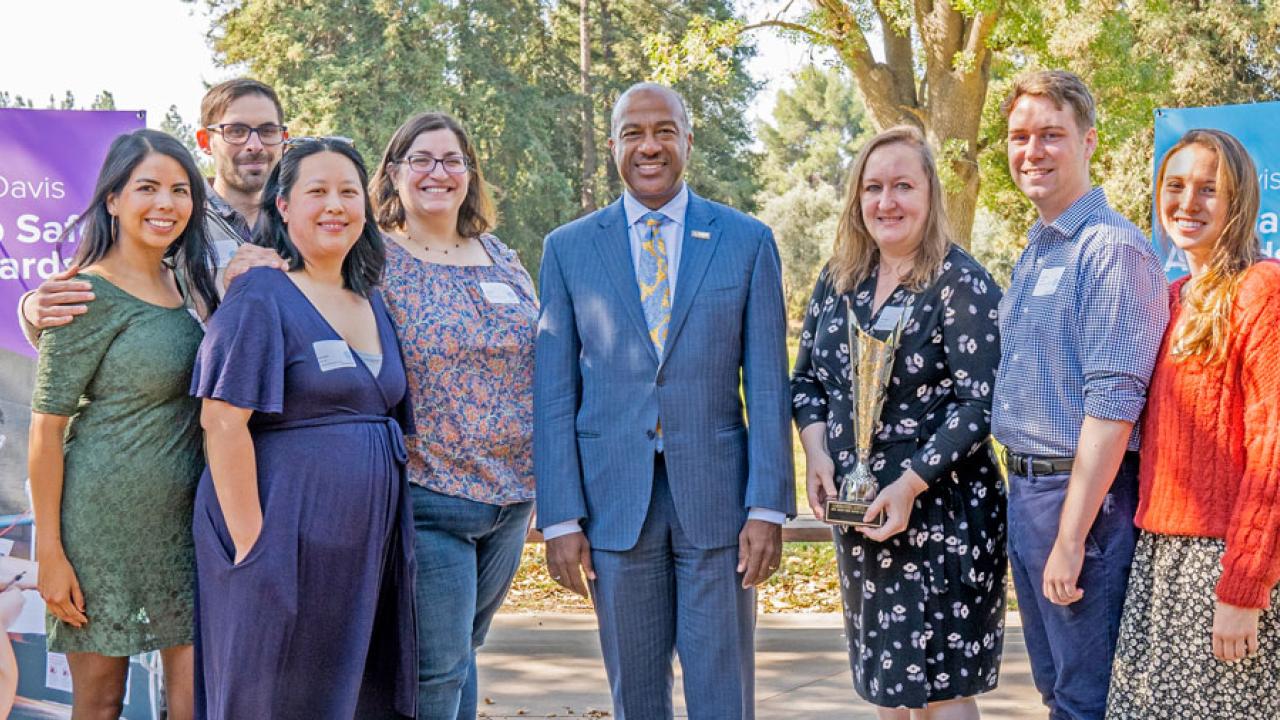Quick Summary
- Inaugural awards program recognizes six winners in all, one from each of six colleges and schools
- The Bales psychology lab, in L&S, comprises 46 “dedicated members” who see community as a big factor in safety
- With $5,000 prize, lab eyes purchase of additional safety equipment
Psychology professor Karen Bales and her lab team, who study monogamy in two mammal species, recently won the grand prize in UC Davis Safety Services’ inaugural Laboratory Safety Awards program.
The awards panel picked the Bales lab (College of Letters and Science) from among six winning labs — one from each of the university’s four colleges and the School of Medicine and the School of Veterinary Medicine.
“It’s important to note that all of these labs exhibit an excellent culture of safety,” said Eric Kvigne, associate vice chancellor of Safety Services. But only one could win the grand prize: $5,000, provided by Safety Services and the Office of Research.
Safety Services already gives out Safety Star Awards, and those will continue (given to individuals, quarterly). The new awards offer recognition to entire labs for their emphasis on safety, and where the personnel follow the motto, “Think Safe. Act Safe. Be Safe.”
Eligibility is limited to labs whose faculty members participate in the university’s comprehensive lab safety review program (i.e., receive annual inspections). The faculty-led Chemical and Lab Safety Committee has endorsed the new awards program.
Judging began with a statistical analysis of lab audit results to determine the top labs, many of which had zero findings, i.e., perfect safety scores. Safety professionals from inside and outside Environmental Health and Safety then filled out questionnaires about the top labs.
Finally, the lab safety awards panel, comprising staff from Safety Services and the Institutional Animal Care and Use Committee, or IACUC, and emeritus faculty, chose the grand prize winner.
Chancellor Gary S. May presented the grand prize trophy and check, and certificates to the other finalists, during a luncheon Oct. 15 at Putah Creek Lodge.
“First, I’d like to thank everyone in this room for your contributions to UC Davis, especially with our research activities,” he said. “Your work gets to the heart of what we do as innovators, fact-finders and educators.”
Nothing is more important to him than the safety of the UC Davis community, the chancellor said, extending his appreciation for the new awards program and describing the recipients as role models for fellow researchers.
“As we all know, laboratories are places of fantastic discovery, but they’re not to be taken lightly. Some labs may be working with dangerous pathogens, or noxious fumes or unstable chemicals. From my days as a graduate student in engineering, I learned pretty quickly that it doesn’t take much for something to go wrong very quickly in the lab.
“So, I salute the awardees today for thinking ahead, suggesting improvements and finding ways for our colleagues to be safe as possible in the lab.”
The Bales lab
According to the Lab Safety Awards webpage, Bales’ Laboratory for Comparative Neurobiology of Monogamy has “an extremely strong safety culture, built through hard work and communication.”
The lab comprises “46 dedicated members who work hard to answer a variety of research questions related to the biology of monogamy and parenting,” the webpage states. The lab has two locations — one for prairie voles on the main campus, the other for coppery titi monkeys, kept at the California National Primate Research Center — but the staff functions as one team.
“For them, lab safety is an ongoing process and requires the active participation of everyone in the lab,” the awards webpage states. “Weekly, hourlong meetings offer opportunities for the Bales lab members to become familiar with one another, offer advice, foster discussions and share progress.
“They believe community is a big reason as to why they are able to keep their lab spaces safe. This year, the lab added a new element of safety education to an existing Bales lab tradition by expanding their end-of-the-year Jeopardy! game, which usually focuses on science, to include lab safety questions. The game is just one part of an annual celebration to thank the lab members for their hard work.”
As for the $5,000 in prize money, lab members have been talking about buying additional equipment that will help with lab safety, such as walkie talkies for graduate students who are working in monkey rooms alone, and possibly a new cart for easier and safer moving of equipment.
The other award winners
- College of Agricultural and Environmental Sciences — Harris Lab (led by Linda Harris, Cooperative Extension specialist in microbial food safety; and chair of the Department of Food Science and Technology)
- College of Biological Sciences — Xu Lab (led by Lifeng Xu, associate professor, Department of Microbiology and Molecular Genetics)
- College of Engineering — Facciotti Lab (led by Marc Facciotti, associate professor, Department of Biomedical Engineering)
- School of Medicine — Burns Lab (led by Marie Burns, professor of ophthalmology and vision science, Department of Cell Biology and Human Anatomy; and Edward Pugh, professor, Department of Cell Biology and Human Anatomy)
- School of Veterinary Medicine — Imai-Leonard Lab (led by Denise Imai-Leonard, associate professor of health sciences, Department of Pathology, Microbiology and Immunology)
Media Resources
Dateline Staff, 530-752-6556, dateline@ucdavis.edu
